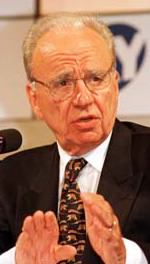|
Sinformation A few months ago, rather than invoking the peculiarities of the US electoral system and its fundamentally unrepresentative character, the major newspapers, even those reputed to be serious, preferred to analyse the personal traits of the two main candidates, "uptight" or "relaxed", "moronic" or "haughty". "Now even politics in the US is moving at internet speed" (1). Five weeks after polling stations closed people still didn't know who the next US president would be. But at "internet speed" the US media proclaimed a victor, then denied it, then had posted another winner, only to contradict themselves again. Something's wrong here, but you don't know what it is, do you, Mr Jones... According to Howard Kurtz, a journalist at The Washington Post, "this whole system of calling a state first may have a lot to do with the media's appetite to be first, to be sensational. After all, we could wait until all the votes are counted. Might be less dramatic, but we'd certainly get it right." Very rational, but rationality is not what drives corporate culture. Sam Donaldson, a star newscaster on ABC, was more astute, TINA's (there is no alternative) the problem: "I think it has to do with being competitive. I mean, competition is what drives our capitalistic system. If you can come up with a better system, since communism doesn't work, I want to listen. And if we at ABC said ... 'We are going to pledge that we will never project again, we will wait until all of the votes in any state has reached the point when it is mathematically impossible' ... the next time around no one would watch us." Donaldson expresses the root of the matter. When journalists subordinate their mission to provide accurate information to being concerned with boosting audience ratings - and thus to increase profits earned for the owners of their companies (2) - everything else follows. And follow it did. Between 2.16 and 2.20 a.m., fed by the same provider of voting estimates, the top five news networks - with Fox first and ABC last - announced that Bush had been elected president. Gore immediately called Bush to concede, only to retract later. The victor for the seat of senator for the state of Washington will likely determine the political balance of the Senate. It was also called prematurely on election night; indeed, it was still undetermined three weeks later. These are errors that cannot be corrected while the news system floats on a sea of money. In a close election, projections made public while voting is still underway can affect the turn-out, and thus the result. In Florida, for instance, the most staunchly Republican counties to the west are in a different time zone from the eastern counties. They were still voting when one television channel, then another, then another, "projected" a Gore victory in the state. A scoop of this sort could have cost Bush thousands of votes. When, a few hours later, Fox News announced this time that Bush had been elected, it was thanks to another estimate of the Florida vote. An estimate issued prematurely by one John Ellis Bush, who explained last year: "I am loyal to my cousin." The said cousin is impatient to move into the White House. Sigh. (1) Headline in The Wall Street Journal Europe, Brussels, 21 September 2000. (2) In the US the main media companies belong to General Electric (NBC), Rupert Murdoch's News Corp (Fox), Walt Disney (ABC), Viacom Inc (CBS) and Time Warner Inc (CNN). Whereas in the 1970s 50 companies controlled half of the US media, they are now in the hands of only six conglomerates. .
|

